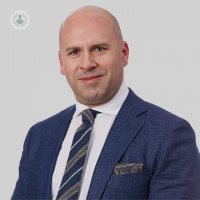Minimally invasive surgery (MIS) for lung cancer: what does it involve?
Written by:What is minimally invasive surgery (MIS) for lung cancer and what are its advantages? Highly respected consultant thoracic surgeon Mr Marco Scarci answers your questions about the surgery.
What does minimally invasive surgery (MIS) for lung cancer entail?
There are multiple ways to carry out minimally invasive surgery for lung cancer. Some surgeons choose to operate using camera assisted surgery. During camera assisted surgery, the cut made is marginally smaller than the cut from an open surgery. The operation is guided through the cut, using the camera as a light source.

Some doctors believe that camera assisted surgery is quite old fashioned and believe that it does not permit good access to all areas inside the chest.
There is a more common and widespread form of minimally invasive surgery which uses three small incisions and dedicated instruments. However, there is an issue with this technique because having three holes in between ribs at different level in the chest together with the use of a trocar (a rigid plastic tube used to insert the camera) may increase the chances of damaging the intercostal nerve with potential for long term pain.
Several surgeons only use one 3cm incision for all procedures, which results in limited pain, scarring and a quicker recovery process.
Are all patients suitable for surgery using this approach?
The vast majority of them are suitable for minimally invasive surgery. The only limitation is that if a cancer is too big it will not come through the ribs, even if in some cases there is a special manoeuvre which allows this to happen safely.
What are the advantages of minimally invasive surgery in this context?
Minimally invasive surgery allows patients to have a significantly reduced hospital stay. Patients also require less morphine- based pain medication, have minimal scarring and are able to return to normal activities more quickly following surgery.
Are there any disadvantages or limitations?
Surgery may be limited due to the size of the tumour and whether it involves critical structures such as the spine, oesophagus or the heart. Otherwise, most cancers can be treated safely by keyhole approach in the hand of experience practitioners.
What does the recovery period look like following minimally invasive surgery for lung cancer?
In the majority of cases, patients improve well in about 1-2 weeks and feel completely normal in 2-3 months. Following surgery, they can do regular, every day activities such as walk, drive, get dressed, go up the stairs and socialise but they feel the effects of the operation if they do something strenuous, such as hiking, cycling, running or golfing. Most patients can return to clerical work in a couple of weeks and manual work in about 3-4 weeks.
In many cases of minimally invasive surgery for lung cancer, 25% of patients are able to return home on day 1, 50% on day 2 and the remaining 25% of patients can return home in 3 or more days.
The vast majority of patients are capable of resuming oral intake immediately after surgery and usually sit out of bed the day of surgery.
If you require surgery for lung cancer and would like to book a consultation with Mr Marco Scarci, do not hesitiate to do by visiting his Top Doctors profile today.


